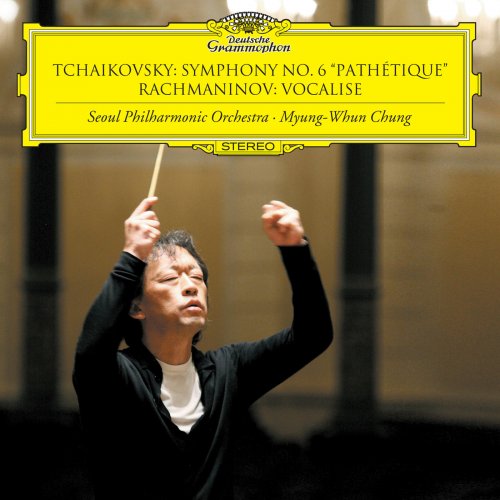
Seoul Philharmonic Orchestra, Myung-Whun Chung - Tchaikovsky: Symphony No. 6 "Pathétique" / Rachmaninov: Vocalise (2012)
BAND/ARTIST: Seoul Philharmonic Orchestra, Myung-Whun Chung
- Title: Tchaikovsky: Symphony No. 6 "Pathétique" / Rachmaninov: Vocalise
- Year Of Release: 2012
- Label: Deutsche Grammophon
- Genre: Classical
- Quality: FLAC (tracks)
- Total Time: 54:03
- Total Size: 238 Mb
- WebSite: Album Preview
Tracklist:
Symphony No. 6 In B Minor, Op. 74, TH.30 (Pyotr Illitch Tchaïkovski)
1. 1. Adagio - Allegro non troppoMyung-Whun Chung 19:39
2. 2. Allegro con graziaMyung-Whun Chung 07:11
3. 3. Allegro molto vivaceMyung-Whun Chung 08:11
4. 4. Finale: Adagio lamentoso - AndanteMyung-Whun Chung 11:46
5. Rachmaninoff: Vocalise, Op.34 No.14Myung-Whun Chung 07:16
Performers:
Seoul Philharmonic Orchestra
Myung-Whun Chung
Symphony No. 6 In B Minor, Op. 74, TH.30 (Pyotr Illitch Tchaïkovski)
1. 1. Adagio - Allegro non troppoMyung-Whun Chung 19:39
2. 2. Allegro con graziaMyung-Whun Chung 07:11
3. 3. Allegro molto vivaceMyung-Whun Chung 08:11
4. 4. Finale: Adagio lamentoso - AndanteMyung-Whun Chung 11:46
5. Rachmaninoff: Vocalise, Op.34 No.14Myung-Whun Chung 07:16
Performers:
Seoul Philharmonic Orchestra
Myung-Whun Chung
The Seoul Philharmonic Orchestra was founded in 1948 and has always played a key role in the development of the classical music scene in South Korea. The appointment of the respected Myung-Whun Chung as music director and principal conductor in 2005 heralded an artistic renaissance for the orchestra. And now that the famous German yellow label has, by way of maestro Chung, taken the Seoul Philharmonic under its wings, the ensemble also seems destined for brilliant horizons outside of the Korean border.
With this release of Tchaikovsky's Sixth, recorded live in concert in Seoul in August 2011, they immediately aim high. And DG knows better than anybody of course with several outstanding recordings of the "Pathétique" in the catalogue (think of Fricsay, Mravinsky, Karajan, Bernstein…) Too high it seems; this new recording isn't going to replace any of these references, and both the conductor as well as the orchestra take part of the blame for that failure.
Chung conducts the outer movements of the symphony in a broad, implacable way. One can admire his stoic refusal to let himself drawn into the slightest excess or effect, but in fact, very little of interest happens along the way. Contrasts are understated, edges are softened, and the emotion is firmly held in check. It's the sort of reading that will please those who consider Tchaikovsky an over the top neurotic. Personally, it made me long for that moment when they would stop merely playing the notes and start making music. The amplitude in sound that Chung is aiming for is hindered by several lapses in flow and tension (as in the 1st movement's Moderato mosso passage just after the second subject began, or even in the development section, where the climax with the hair-raising scalic descent puffs out of breath midway). The appearance of the B minor trio in the Allegro con grazia is lacking this anxious undercurrent keeping it from becoming merely pretty. There is no doubt Chung always has the overall architecture of the symphony in mind, keeping the real shattering climax for the end, but it sure takes a long way getting there.
With this release of Tchaikovsky's Sixth, recorded live in concert in Seoul in August 2011, they immediately aim high. And DG knows better than anybody of course with several outstanding recordings of the "Pathétique" in the catalogue (think of Fricsay, Mravinsky, Karajan, Bernstein…) Too high it seems; this new recording isn't going to replace any of these references, and both the conductor as well as the orchestra take part of the blame for that failure.
Chung conducts the outer movements of the symphony in a broad, implacable way. One can admire his stoic refusal to let himself drawn into the slightest excess or effect, but in fact, very little of interest happens along the way. Contrasts are understated, edges are softened, and the emotion is firmly held in check. It's the sort of reading that will please those who consider Tchaikovsky an over the top neurotic. Personally, it made me long for that moment when they would stop merely playing the notes and start making music. The amplitude in sound that Chung is aiming for is hindered by several lapses in flow and tension (as in the 1st movement's Moderato mosso passage just after the second subject began, or even in the development section, where the climax with the hair-raising scalic descent puffs out of breath midway). The appearance of the B minor trio in the Allegro con grazia is lacking this anxious undercurrent keeping it from becoming merely pretty. There is no doubt Chung always has the overall architecture of the symphony in mind, keeping the real shattering climax for the end, but it sure takes a long way getting there.
DOWNLOAD FROM ISRA.CLOUD
Myung-Whun Chung Tchaikovsky Symphony No 6 Pathétique 12 2009.rar - 238.1 MB
Myung-Whun Chung Tchaikovsky Symphony No 6 Pathétique 12 2009.rar - 238.1 MB
As a ISRA.CLOUD's PREMIUM member you will have the following benefits:
- Unlimited high speed downloads
- Download directly without waiting time
- Unlimited parallel downloads
- Support for download accelerators
- No advertising
- Resume broken downloads


